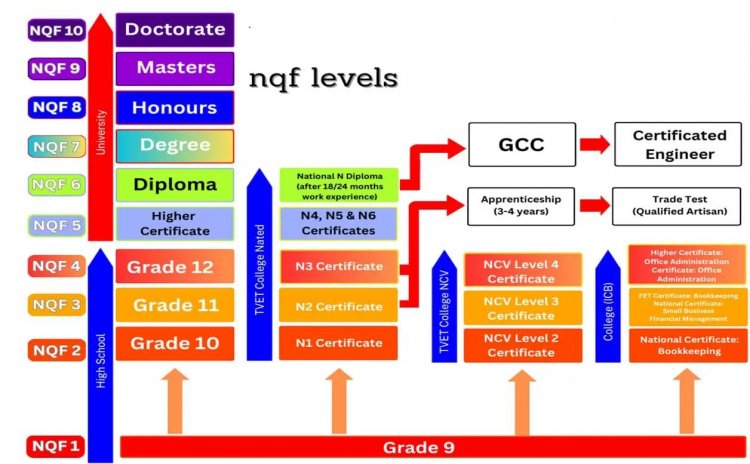What is the NQF? (National Qualifications Framework)
The National Qualifications Framework (NQF) is a system that organises all qualifications in South Africa into 10 levels, from basic education (Grade 9) to advanced degrees (PhD). NQF Levels 1-4: School education (Grade 9 to Matric) or vocational training. NQF Levels 5-6: Higher certificates and diplomas. NQF Levels 7-10: Bachelor’s, Master’s, and Doctoral degrees.

What is the NQF?
The National Qualifications Framework (NQF) is a system that organizes all qualifications in South Africa. It helps people understand the levels of learning, from basic education to advanced qualifications like university degrees. The NQF was created to ensure that education and training in South Africa are of high quality and comparable across institutions. It also makes it easier for learners to move between different types of qualifications.
NQF Levels Explained The NQF has 10 levels, with each level representing a step in education and training. Let’s break them down:
NQF Level 1 What it means:
Grade 9 or General Education Certificate (GEC).
Who it’s for: People completing basic schooling or adult education equivalent.
NQF Level 2 What it means:
Grade 10 or National Certificate (Vocational) Level 2.
Who it’s for: High school learners or those in vocational training.
NQF Level 3 What it means:
Grade 11 or National Certificate (Vocational) Level 3.
Who it’s for: Learners continuing secondary education or vocational studies.
NQF Level 4 What it means:
Grade 12 (Matric) or National Certificate (Vocational) Level 4.
Who it’s for: High school graduates or those with equivalent vocational qualifications.
NQF Level 5 What it means:
Higher Certificate or Advanced National (Vocational) Certificate.
Who it’s for: People starting higher education or short professional programs.
NQF Level 6 What it means:
Diploma or Advanced Certificate.
Who it’s for: Those completing mid-level qualifications like a 2-3 year diploma.
NQF Level 7 What it means:
Bachelor’s Degree or Advanced Diploma.
Who it’s for: University students completing undergraduate studies.
NQF Level 8 What it means:
Honours Degree or Postgraduate Diploma.
Who it’s for: Graduates pursuing advanced studies after a bachelor’s degree.
NQF Level 9 What it means:
Master’s Degree. Who it’s for: People specialising in a specific field after completing an honours degree.
NQF Level 10 What it means:
Doctoral Degree (PhD).
Who it’s for: Researchers and experts completing the highest academic qualification.
Why is the NQF Important?
It creates a standard: All qualifications are ranked the same way, so you know what they mean. Helps with career planning: Employers understand your education level, and you can see what qualifications you need for your goals. Enables lifelong learning: You can move between education systems, like from a diploma to a degree.
Is NQF Level 4 the same as Matric?
Yes, it includes Matric and equivalent vocational qualifications.
Can I go from an NQF Level 4 to Level 6 directly?
Generally, you need to complete Level 5 first, but bridging programs might help.







































